The Story: One of the wonders of director John Ford's work is how he could combine comedy and drama and do it very quickly. This has brought some critical sniffing from academics complaining of his "tonal shifts"—as if drama couldn't have some ironic levity to it—and that one would undermine the other. Such a thing (goes the thinking) is indicative of "low-brow" entertainment.
I rather think the opposite.
Take this scene from My Darling Clementine (what some have argued is Ford's greatest western—I don't agree but it's right "up there"): moments after a rollicking, boisterously chaotic scene where Tombstone's citizenry is about to lynch the town's opera-house owner for not producing the Shakespearean actor that was promised ("Bird imitators! Bird imitators! That's all we get!" "Marshal, be reasonable! All we want
to do is to ride him around town a couple of times on the rail!")to a haunting scene where the film's personification of doom—Doc Holliday—completes Hamlet's soliloquy when that previously mentioned Shakespearean thesp' has trouble stage-treading "the undiscoverd' country" portion. Talk about "tonal shift"—from the senselessly raucous rubism of frontier justice to the contemplation of death and its place in the lives of its characters and its near occasion within a hand's reach.
Of course, Doc Holliday does the recitation. And does it...by heart. He's medically-trained, college-educated. He knows his "Hamlet". But, he also knows of that section and has probably contemplated it, seeing has he's got one foot in the grave already—he's come to the dry-air of Tombstone because of the TB that's eating away at his lungs. And the same fatalism that makes him quick on the draw (in cards or confrontation) shadows his very existence. Ford treats him like Death itself, dressing him darkly, keeping him in shadow, and, here, reciting Shakespeare's contemplation of action versus inaction versus consequences, reciting the darker part of the speech, choking on the "conscience doth make cowards of us all." Doc has a conscience of death more than any of them. No wonder he chokes on the words. It's a harbinger of things to come.
But, given how the scene plays out ("Exeunt 'Doc'"), it is pretty sure that neither Wyatt or Old Man Clanton have ever read "Hamlet". They don't have time for indecision...or use for it.
And death? That'll happen to other people.
The Set-up: Wyatt Earp (Henry Fonda), with his brothers, have settled in the town of Tombstone, Arizona, after their youngest brother James has been killed by rustlers, suspected to be the gang run by Old Man Clanton (Walter Brennan). Now Wyatt is Marshall of the frontier town, trying to keep the peace, even with such notorious residents as the gambler and gun-fighter "Doc" Holliday (Victor Mature). Earp and Holliday become allies, and one night—after "Doc" has had a particularly hazardous shave—go out on the town. But, Wyatt's "job" is never too far away.
Action!
OPERA HOUSE OWNER: as if I didn't already
have enough trouble!
That eminent actor,
that sterling tragedian!
TOWNSMAN 2: Marshal, be reasonable! All we want
to do is to ride him around town a couple of times on the rail!
-
THORNDYKE: That is the question!
Whether 'tis nobler
in the mind!
To suffer the slings and arrows
of outrageous fortune!
Or to take arms
against a sea of troubles!
And by opposing end them?
THORNDYKE: thousand natural shocks
that flesh is heir to!
'Tis a consummation
devoutly to be wish'd!
To die,
THORNDYKE: Ay, there's the rub!
For in that sleep of death,
what dreams may come!
When we have shuffled off
this mortal coil...
THORNDYKE: Must give us pause!
THORNDYKE: And the spurns that patient
merit of the unworthy take!
THORNDYKE: When he himself
might his quietus make! With a bare bodkin?
DOC: The undiscover'd country!
From whose bourne
no traveler returns!
DOC: Puzzles the will and makes us
rather bear those ills we have...
DOC: than fly to others
that we know not of!
Thus, conscience does make
cowards of us all!
THORNDYKE: Nor for tavern louts!
Wyatt unholsters his gun.
and clobbers IKE.
Phin draws on Wyatt...
...who fires back.
Old Man Clanton, hearing the gunshots, bursts out of the card room.
WOMAN: ¿Qué pasa? ¿Qué pasa?
and clobbers IKE.
Phin draws on Wyatt...
...who fires back.
Old Man Clanton, hearing the gunshots, bursts out of the card room.
WOMAN: ¿Qué pasa? ¿Qué pasa?
Words by Samuel G. Engel, Winston Miller, and William Shakespeare
Pictures by Joseph MacDonald and John Ford
My Darling Clementine is available on DVD from Twentieth Century Fox Home Entertainment and on Blu-Ray from The Criterion Collection.






















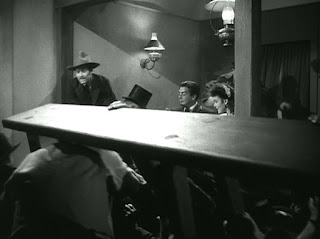




































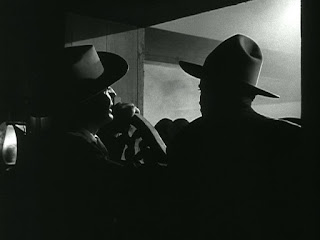










































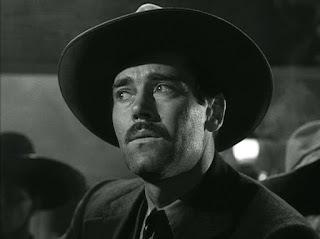











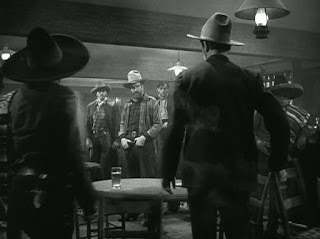




















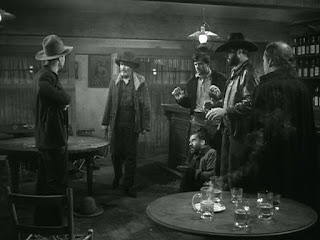


















No comments:
Post a Comment